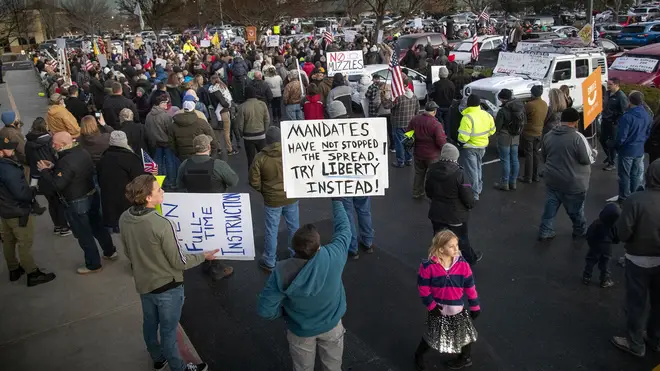
Nick Ferrari 7am - 10am
10 December 2020, 02:24

Coronavirus deaths across the country are running at more than 2,200 a day on average.
Arguments over mask requirements and other restrictions have turned ugly in recent days as the deadly coronavirus surge across the US engulfs small and medium-size cities that once seemed safely removed from the outbreak.
In Boise, Idaho, public health officials about to vote on a four-county mask mandate abruptly ended a meeting on Tuesday evening because of fears for their safety amid anti-mask protests outside the building and at some of their homes.
One health board member tearfully announced she had to rush home to be with her child because of the protesters, who were seen on video banging on buckets, blaring air horns and sirens, and blasting a sound clip of gunfire from the violence-drenched movie Scarface outside her front door.
“I am sad. I am tired. I fear that, in my choosing to hold public office, my family has too often paid the price,” said the board member, Ada County commissioner Diana Lachiondo.
“I increasingly don’t recognise this place. There is an ugliness and cruelty in our national rhetoric that is reaching a fevered pitch here at home, and that should worry us all.”
Boise police said three arrest warrants were issued in connection with the demonstrations at board members’ homes.
In South Dakota, the mayor of Rapid City said City Council members were harassed and threatened over a proposed citywide mask mandate that failed this week even as intensive care units across the state filled with Covid-19 patients.
The tensions are flaring amid an epic surge in US deaths, hospitalisations and infections over the past several weeks.

Deaths are running at more than 2,200 a day on average, all but matching the level seen during the last spring’s peak in and around New York City.
New cases per day have rocketed to more than 200,000 on average, and the number of patients in the hospital with Covid-19 stood at almost 105,000 on Tuesday, another all-time high.
The grim figures led the usually stoic health director of the nation’s most populated county to become emotional.
Barbara Ferrer described “a devastating increase in deaths” in Los Angeles County, with the total hitting 8,075 on Wednesday.
“Over 8,000 people who were beloved members of their families are not coming back,” Ms Ferrer said, fighting back tears.
Meanwhile, protesters in Montana’s Gallatin County have gathered for two consecutive weeks outside the Bozeman home of county health officer Matt Kelley to decry regulations, including a statewide mask mandate.
They have carried signs reading, “We refuse to be your experiment” and “Oxygen is essential”.
Last week, around 80 people lined Bozeman’s Main Street to support Mr Kelley and other health officials.
In Montana’s Flathead County, where officials recorded 17 coronavirus-related deaths over 18 days and resistance to masks runs strong, the interim public health officer is resigning when her contract is up at year’s end, citing a lack of support from local authorities for measures to control the scourge.

South Dakota has suffered through the country’s worst rate of Covid-19 deaths per capita over the last week, but governor Kristi Noem has been ardent in her opposition to mask mandates or other aggressive efforts to slow infections.
That hands-off approach drew vocal support at Rapid City Council meetings, even as doctors warned that the only large hospital in the western half of the state is facing a crisis and patients are being flown out of the state.
The meetings drew hours of testimony from people who said the dangers of the virus are overblown and that mask requirements violate their liberties.
Dr Stephen Neabore, who works in the biggest hospital system in the region, said he has been frustrated as he tries to persuade people to wear masks.
After working in New York City and studying medicine in England, he said, he sees a distinct scepticism toward government around him.
“I still see people out here that will tell me that they don’t believe it’s any worse than a common cold,” he said.